Professional Practice in Nutrition: Competency Literature Review
VerifiedAdded on 2022/10/11
|12
|3556
|19
Literature Review
AI Summary
This literature review examines the critical issue of nutrition competencies among graduates in Australia, highlighting its significance for public health. It explores the prevalence, significance, and public health impact of lacking optimal nutrition competencies. The review delves into the standards set by organizations like the Dietitians Association of Australia and the Nutrition Society of Australia, emphasizing the skills and knowledge needed for effective practice. It discusses the implications of competency gaps, including the development of a less-skilled workforce and the potential for increased disease burden. The review also addresses social, educational, and economic factors influencing competency, such as limited academic emphasis and inadequate placement opportunities. Furthermore, it analyzes strategies like the 'Eat Well Australia' framework and its initiatives to enhance the public health nutrition workforce. In conclusion, the review underscores the importance of nutrition competency for graduates and the need for policies to address current gaps and improve public health outcomes. The document also includes a literature review matrix summarizing key findings from various sources.
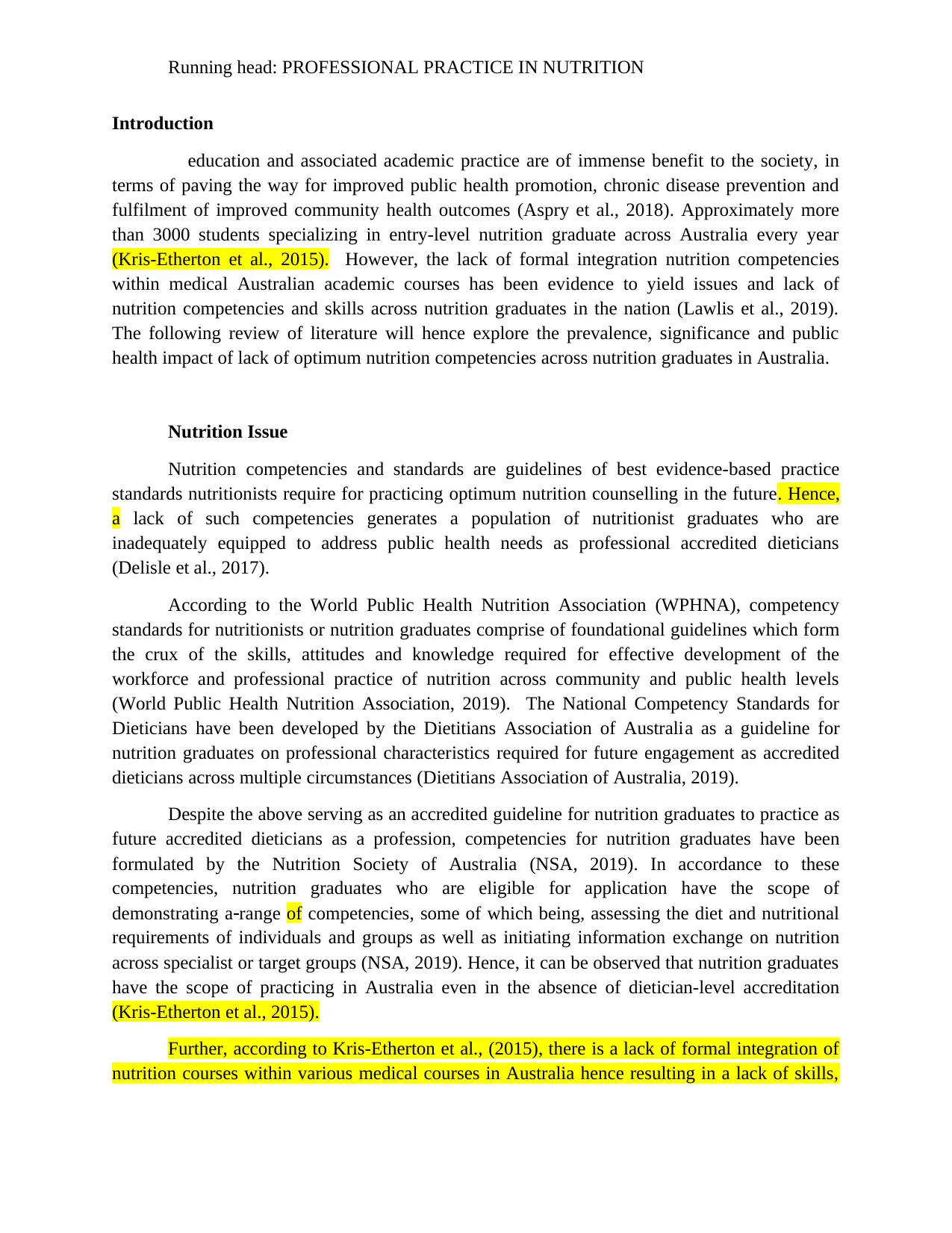
Running head: PROFESSIONAL PRACTICE IN NUTRITION
Introduction
education and associated academic practice are of immense benefit to the society, in
terms of paving the way for improved public health promotion, chronic disease prevention and
fulfilment of improved community health outcomes (Aspry et al., 2018). Approximately more
than 3000 students specializing in entry-level nutrition graduate across Australia every year
(Kris-Etherton et al., 2015). However, the lack of formal integration nutrition competencies
within medical Australian academic courses has been evidence to yield issues and lack of
nutrition competencies and skills across nutrition graduates in the nation (Lawlis et al., 2019).
The following review of literature will hence explore the prevalence, significance and public
health impact of lack of optimum nutrition competencies across nutrition graduates in Australia.
Nutrition Issue
Nutrition competencies and standards are guidelines of best evidence-based practice
standards nutritionists require for practicing optimum nutrition counselling in the future. Hence,
a lack of such competencies generates a population of nutritionist graduates who are
inadequately equipped to address public health needs as professional accredited dieticians
(Delisle et al., 2017).
According to the World Public Health Nutrition Association (WPHNA), competency
standards for nutritionists or nutrition graduates comprise of foundational guidelines which form
the crux of the skills, attitudes and knowledge required for effective development of the
workforce and professional practice of nutrition across community and public health levels
(World Public Health Nutrition Association, 2019). The National Competency Standards for
Dieticians have been developed by the Dietitians Association of Australia as a guideline for
nutrition graduates on professional characteristics required for future engagement as accredited
dieticians across multiple circumstances (Dietitians Association of Australia, 2019).
Despite the above serving as an accredited guideline for nutrition graduates to practice as
future accredited dieticians as a profession, competencies for nutrition graduates have been
formulated by the Nutrition Society of Australia (NSA, 2019). In accordance to these
competencies, nutrition graduates who are eligible for application have the scope of
demonstrating a range of competencies, some of which being, assessing the diet and nutritional
requirements of individuals and groups as well as initiating information exchange on nutrition
across specialist or target groups (NSA, 2019). Hence, it can be observed that nutrition graduates
have the scope of practicing in Australia even in the absence of dietician-level accreditation
(Kris-Etherton et al., 2015).
Further, according to Kris-Etherton et al., (2015), there is a lack of formal integration of
nutrition courses within various medical courses in Australia hence resulting in a lack of skills,
Introduction
education and associated academic practice are of immense benefit to the society, in
terms of paving the way for improved public health promotion, chronic disease prevention and
fulfilment of improved community health outcomes (Aspry et al., 2018). Approximately more
than 3000 students specializing in entry-level nutrition graduate across Australia every year
(Kris-Etherton et al., 2015). However, the lack of formal integration nutrition competencies
within medical Australian academic courses has been evidence to yield issues and lack of
nutrition competencies and skills across nutrition graduates in the nation (Lawlis et al., 2019).
The following review of literature will hence explore the prevalence, significance and public
health impact of lack of optimum nutrition competencies across nutrition graduates in Australia.
Nutrition Issue
Nutrition competencies and standards are guidelines of best evidence-based practice
standards nutritionists require for practicing optimum nutrition counselling in the future. Hence,
a lack of such competencies generates a population of nutritionist graduates who are
inadequately equipped to address public health needs as professional accredited dieticians
(Delisle et al., 2017).
According to the World Public Health Nutrition Association (WPHNA), competency
standards for nutritionists or nutrition graduates comprise of foundational guidelines which form
the crux of the skills, attitudes and knowledge required for effective development of the
workforce and professional practice of nutrition across community and public health levels
(World Public Health Nutrition Association, 2019). The National Competency Standards for
Dieticians have been developed by the Dietitians Association of Australia as a guideline for
nutrition graduates on professional characteristics required for future engagement as accredited
dieticians across multiple circumstances (Dietitians Association of Australia, 2019).
Despite the above serving as an accredited guideline for nutrition graduates to practice as
future accredited dieticians as a profession, competencies for nutrition graduates have been
formulated by the Nutrition Society of Australia (NSA, 2019). In accordance to these
competencies, nutrition graduates who are eligible for application have the scope of
demonstrating a range of competencies, some of which being, assessing the diet and nutritional
requirements of individuals and groups as well as initiating information exchange on nutrition
across specialist or target groups (NSA, 2019). Hence, it can be observed that nutrition graduates
have the scope of practicing in Australia even in the absence of dietician-level accreditation
(Kris-Etherton et al., 2015).
Further, according to Kris-Etherton et al., (2015), there is a lack of formal integration of
nutrition courses within various medical courses in Australia hence resulting in a lack of skills,
Paraphrase This Document
Need a fresh take? Get an instant paraphrase of this document with our AI Paraphraser
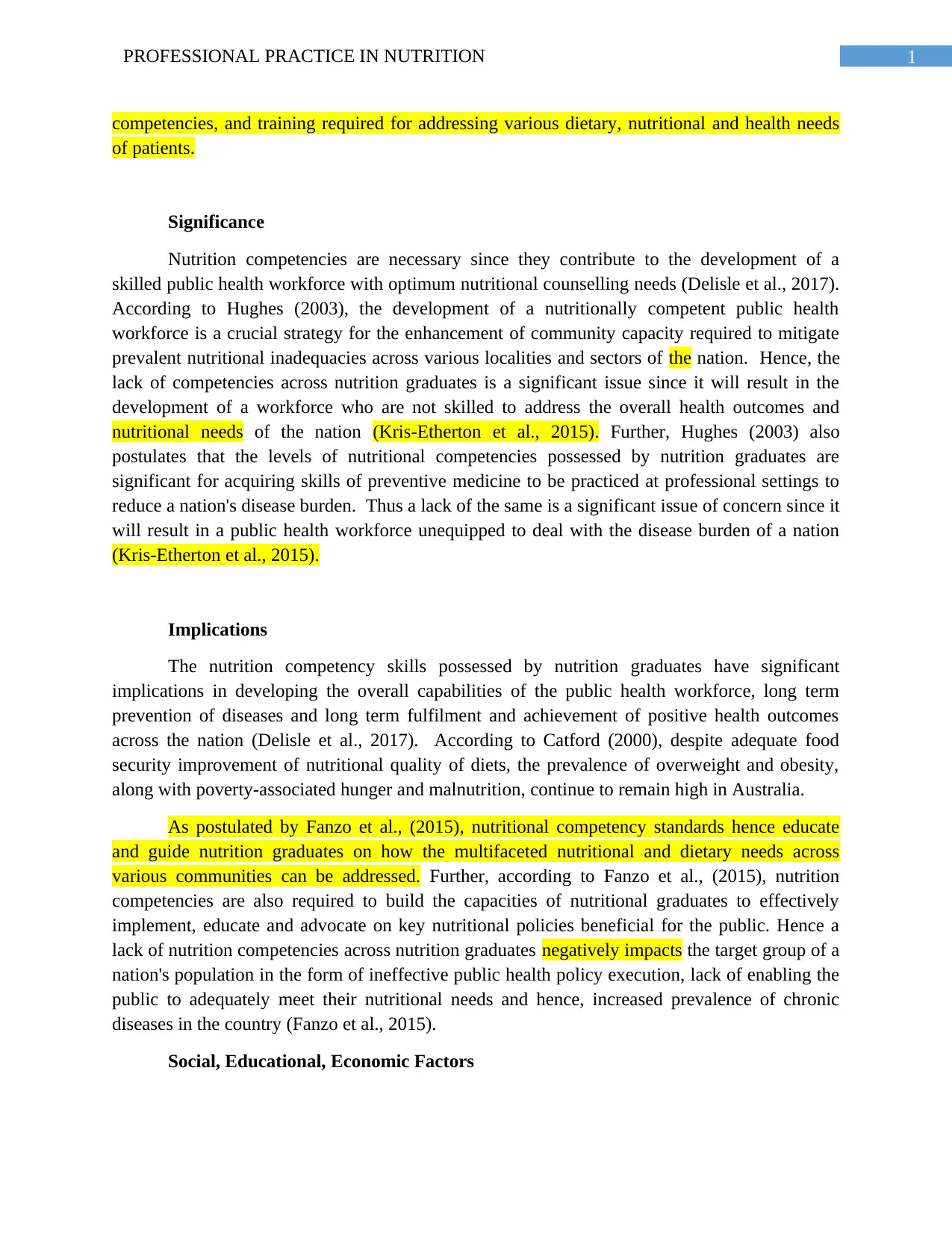
1PROFESSIONAL PRACTICE IN NUTRITION
competencies, and training required for addressing various dietary, nutritional and health needs
of patients.
Significance
Nutrition competencies are necessary since they contribute to the development of a
skilled public health workforce with optimum nutritional counselling needs (Delisle et al., 2017).
According to Hughes (2003), the development of a nutritionally competent public health
workforce is a crucial strategy for the enhancement of community capacity required to mitigate
prevalent nutritional inadequacies across various localities and sectors of the nation. Hence, the
lack of competencies across nutrition graduates is a significant issue since it will result in the
development of a workforce who are not skilled to address the overall health outcomes and
nutritional needs of the nation (Kris-Etherton et al., 2015). Further, Hughes (2003) also
postulates that the levels of nutritional competencies possessed by nutrition graduates are
significant for acquiring skills of preventive medicine to be practiced at professional settings to
reduce a nation's disease burden. Thus a lack of the same is a significant issue of concern since it
will result in a public health workforce unequipped to deal with the disease burden of a nation
(Kris-Etherton et al., 2015).
Implications
The nutrition competency skills possessed by nutrition graduates have significant
implications in developing the overall capabilities of the public health workforce, long term
prevention of diseases and long term fulfilment and achievement of positive health outcomes
across the nation (Delisle et al., 2017). According to Catford (2000), despite adequate food
security improvement of nutritional quality of diets, the prevalence of overweight and obesity,
along with poverty-associated hunger and malnutrition, continue to remain high in Australia.
As postulated by Fanzo et al., (2015), nutritional competency standards hence educate
and guide nutrition graduates on how the multifaceted nutritional and dietary needs across
various communities can be addressed. Further, according to Fanzo et al., (2015), nutrition
competencies are also required to build the capacities of nutritional graduates to effectively
implement, educate and advocate on key nutritional policies beneficial for the public. Hence a
lack of nutrition competencies across nutrition graduates negatively impacts the target group of a
nation's population in the form of ineffective public health policy execution, lack of enabling the
public to adequately meet their nutritional needs and hence, increased prevalence of chronic
diseases in the country (Fanzo et al., 2015).
Social, Educational, Economic Factors
competencies, and training required for addressing various dietary, nutritional and health needs
of patients.
Significance
Nutrition competencies are necessary since they contribute to the development of a
skilled public health workforce with optimum nutritional counselling needs (Delisle et al., 2017).
According to Hughes (2003), the development of a nutritionally competent public health
workforce is a crucial strategy for the enhancement of community capacity required to mitigate
prevalent nutritional inadequacies across various localities and sectors of the nation. Hence, the
lack of competencies across nutrition graduates is a significant issue since it will result in the
development of a workforce who are not skilled to address the overall health outcomes and
nutritional needs of the nation (Kris-Etherton et al., 2015). Further, Hughes (2003) also
postulates that the levels of nutritional competencies possessed by nutrition graduates are
significant for acquiring skills of preventive medicine to be practiced at professional settings to
reduce a nation's disease burden. Thus a lack of the same is a significant issue of concern since it
will result in a public health workforce unequipped to deal with the disease burden of a nation
(Kris-Etherton et al., 2015).
Implications
The nutrition competency skills possessed by nutrition graduates have significant
implications in developing the overall capabilities of the public health workforce, long term
prevention of diseases and long term fulfilment and achievement of positive health outcomes
across the nation (Delisle et al., 2017). According to Catford (2000), despite adequate food
security improvement of nutritional quality of diets, the prevalence of overweight and obesity,
along with poverty-associated hunger and malnutrition, continue to remain high in Australia.
As postulated by Fanzo et al., (2015), nutritional competency standards hence educate
and guide nutrition graduates on how the multifaceted nutritional and dietary needs across
various communities can be addressed. Further, according to Fanzo et al., (2015), nutrition
competencies are also required to build the capacities of nutritional graduates to effectively
implement, educate and advocate on key nutritional policies beneficial for the public. Hence a
lack of nutrition competencies across nutrition graduates negatively impacts the target group of a
nation's population in the form of ineffective public health policy execution, lack of enabling the
public to adequately meet their nutritional needs and hence, increased prevalence of chronic
diseases in the country (Fanzo et al., 2015).
Social, Educational, Economic Factors
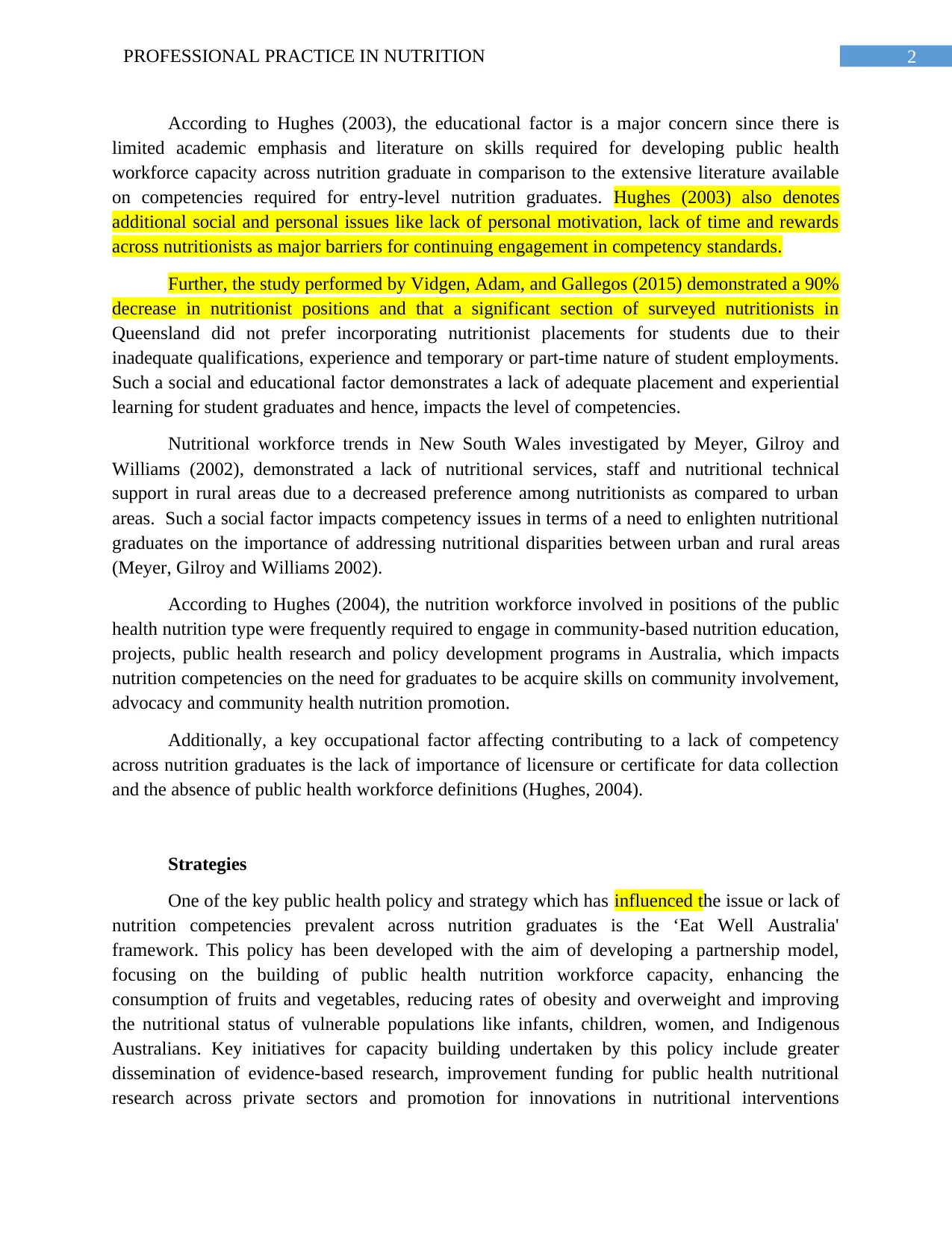
2PROFESSIONAL PRACTICE IN NUTRITION
According to Hughes (2003), the educational factor is a major concern since there is
limited academic emphasis and literature on skills required for developing public health
workforce capacity across nutrition graduate in comparison to the extensive literature available
on competencies required for entry-level nutrition graduates. Hughes (2003) also denotes
additional social and personal issues like lack of personal motivation, lack of time and rewards
across nutritionists as major barriers for continuing engagement in competency standards.
Further, the study performed by Vidgen, Adam, and Gallegos (2015) demonstrated a 90%
decrease in nutritionist positions and that a significant section of surveyed nutritionists in
Queensland did not prefer incorporating nutritionist placements for students due to their
inadequate qualifications, experience and temporary or part-time nature of student employments.
Such a social and educational factor demonstrates a lack of adequate placement and experiential
learning for student graduates and hence, impacts the level of competencies.
Nutritional workforce trends in New South Wales investigated by Meyer, Gilroy and
Williams (2002), demonstrated a lack of nutritional services, staff and nutritional technical
support in rural areas due to a decreased preference among nutritionists as compared to urban
areas. Such a social factor impacts competency issues in terms of a need to enlighten nutritional
graduates on the importance of addressing nutritional disparities between urban and rural areas
(Meyer, Gilroy and Williams 2002).
According to Hughes (2004), the nutrition workforce involved in positions of the public
health nutrition type were frequently required to engage in community-based nutrition education,
projects, public health research and policy development programs in Australia, which impacts
nutrition competencies on the need for graduates to be acquire skills on community involvement,
advocacy and community health nutrition promotion.
Additionally, a key occupational factor affecting contributing to a lack of competency
across nutrition graduates is the lack of importance of licensure or certificate for data collection
and the absence of public health workforce definitions (Hughes, 2004).
Strategies
One of the key public health policy and strategy which has influenced the issue or lack of
nutrition competencies prevalent across nutrition graduates is the ‘Eat Well Australia'
framework. This policy has been developed with the aim of developing a partnership model,
focusing on the building of public health nutrition workforce capacity, enhancing the
consumption of fruits and vegetables, reducing rates of obesity and overweight and improving
the nutritional status of vulnerable populations like infants, children, women, and Indigenous
Australians. Key initiatives for capacity building undertaken by this policy include greater
dissemination of evidence-based research, improvement funding for public health nutritional
research across private sectors and promotion for innovations in nutritional interventions
According to Hughes (2003), the educational factor is a major concern since there is
limited academic emphasis and literature on skills required for developing public health
workforce capacity across nutrition graduate in comparison to the extensive literature available
on competencies required for entry-level nutrition graduates. Hughes (2003) also denotes
additional social and personal issues like lack of personal motivation, lack of time and rewards
across nutritionists as major barriers for continuing engagement in competency standards.
Further, the study performed by Vidgen, Adam, and Gallegos (2015) demonstrated a 90%
decrease in nutritionist positions and that a significant section of surveyed nutritionists in
Queensland did not prefer incorporating nutritionist placements for students due to their
inadequate qualifications, experience and temporary or part-time nature of student employments.
Such a social and educational factor demonstrates a lack of adequate placement and experiential
learning for student graduates and hence, impacts the level of competencies.
Nutritional workforce trends in New South Wales investigated by Meyer, Gilroy and
Williams (2002), demonstrated a lack of nutritional services, staff and nutritional technical
support in rural areas due to a decreased preference among nutritionists as compared to urban
areas. Such a social factor impacts competency issues in terms of a need to enlighten nutritional
graduates on the importance of addressing nutritional disparities between urban and rural areas
(Meyer, Gilroy and Williams 2002).
According to Hughes (2004), the nutrition workforce involved in positions of the public
health nutrition type were frequently required to engage in community-based nutrition education,
projects, public health research and policy development programs in Australia, which impacts
nutrition competencies on the need for graduates to be acquire skills on community involvement,
advocacy and community health nutrition promotion.
Additionally, a key occupational factor affecting contributing to a lack of competency
across nutrition graduates is the lack of importance of licensure or certificate for data collection
and the absence of public health workforce definitions (Hughes, 2004).
Strategies
One of the key public health policy and strategy which has influenced the issue or lack of
nutrition competencies prevalent across nutrition graduates is the ‘Eat Well Australia'
framework. This policy has been developed with the aim of developing a partnership model,
focusing on the building of public health nutrition workforce capacity, enhancing the
consumption of fruits and vegetables, reducing rates of obesity and overweight and improving
the nutritional status of vulnerable populations like infants, children, women, and Indigenous
Australians. Key initiatives for capacity building undertaken by this policy include greater
dissemination of evidence-based research, improvement funding for public health nutritional
research across private sectors and promotion for innovations in nutritional interventions
⊘ This is a preview!⊘
Do you want full access?
Subscribe today to unlock all pages.

Trusted by 1+ million students worldwide
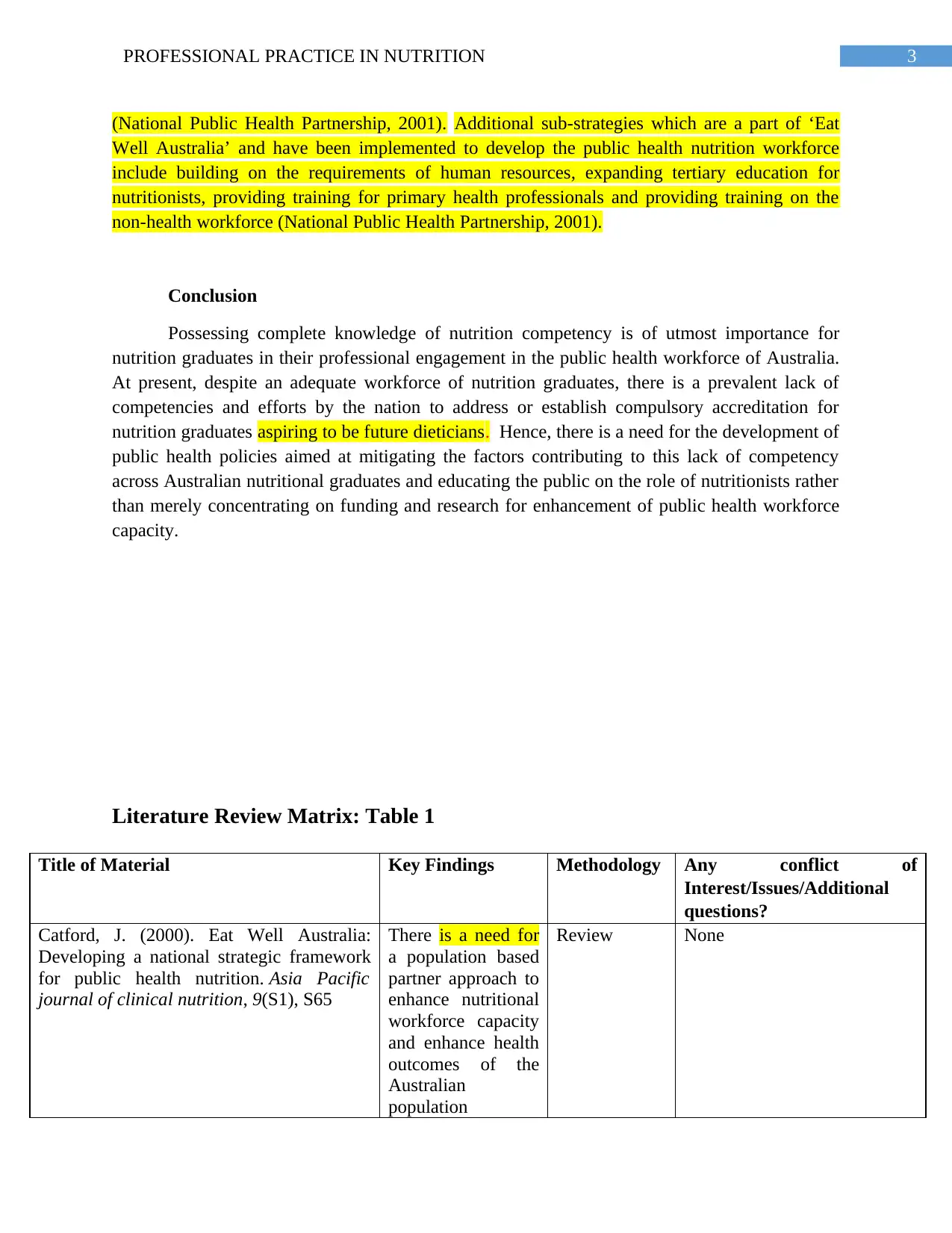
3PROFESSIONAL PRACTICE IN NUTRITION
(National Public Health Partnership, 2001). Additional sub-strategies which are a part of ‘Eat
Well Australia’ and have been implemented to develop the public health nutrition workforce
include building on the requirements of human resources, expanding tertiary education for
nutritionists, providing training for primary health professionals and providing training on the
non-health workforce (National Public Health Partnership, 2001).
Conclusion
Possessing complete knowledge of nutrition competency is of utmost importance for
nutrition graduates in their professional engagement in the public health workforce of Australia.
At present, despite an adequate workforce of nutrition graduates, there is a prevalent lack of
competencies and efforts by the nation to address or establish compulsory accreditation for
nutrition graduates aspiring to be future dieticians. Hence, there is a need for the development of
public health policies aimed at mitigating the factors contributing to this lack of competency
across Australian nutritional graduates and educating the public on the role of nutritionists rather
than merely concentrating on funding and research for enhancement of public health workforce
capacity.
Literature Review Matrix: Table 1
Title of Material Key Findings Methodology Any conflict of
Interest/Issues/Additional
questions?
Catford, J. (2000). Eat Well Australia:
Developing a national strategic framework
for public health nutrition. Asia Pacific
journal of clinical nutrition, 9(S1), S65
There is a need for
a population based
partner approach to
enhance nutritional
workforce capacity
and enhance health
outcomes of the
Australian
population
Review None
(National Public Health Partnership, 2001). Additional sub-strategies which are a part of ‘Eat
Well Australia’ and have been implemented to develop the public health nutrition workforce
include building on the requirements of human resources, expanding tertiary education for
nutritionists, providing training for primary health professionals and providing training on the
non-health workforce (National Public Health Partnership, 2001).
Conclusion
Possessing complete knowledge of nutrition competency is of utmost importance for
nutrition graduates in their professional engagement in the public health workforce of Australia.
At present, despite an adequate workforce of nutrition graduates, there is a prevalent lack of
competencies and efforts by the nation to address or establish compulsory accreditation for
nutrition graduates aspiring to be future dieticians. Hence, there is a need for the development of
public health policies aimed at mitigating the factors contributing to this lack of competency
across Australian nutritional graduates and educating the public on the role of nutritionists rather
than merely concentrating on funding and research for enhancement of public health workforce
capacity.
Literature Review Matrix: Table 1
Title of Material Key Findings Methodology Any conflict of
Interest/Issues/Additional
questions?
Catford, J. (2000). Eat Well Australia:
Developing a national strategic framework
for public health nutrition. Asia Pacific
journal of clinical nutrition, 9(S1), S65
There is a need for
a population based
partner approach to
enhance nutritional
workforce capacity
and enhance health
outcomes of the
Australian
population
Review None
Paraphrase This Document
Need a fresh take? Get an instant paraphrase of this document with our AI Paraphraser
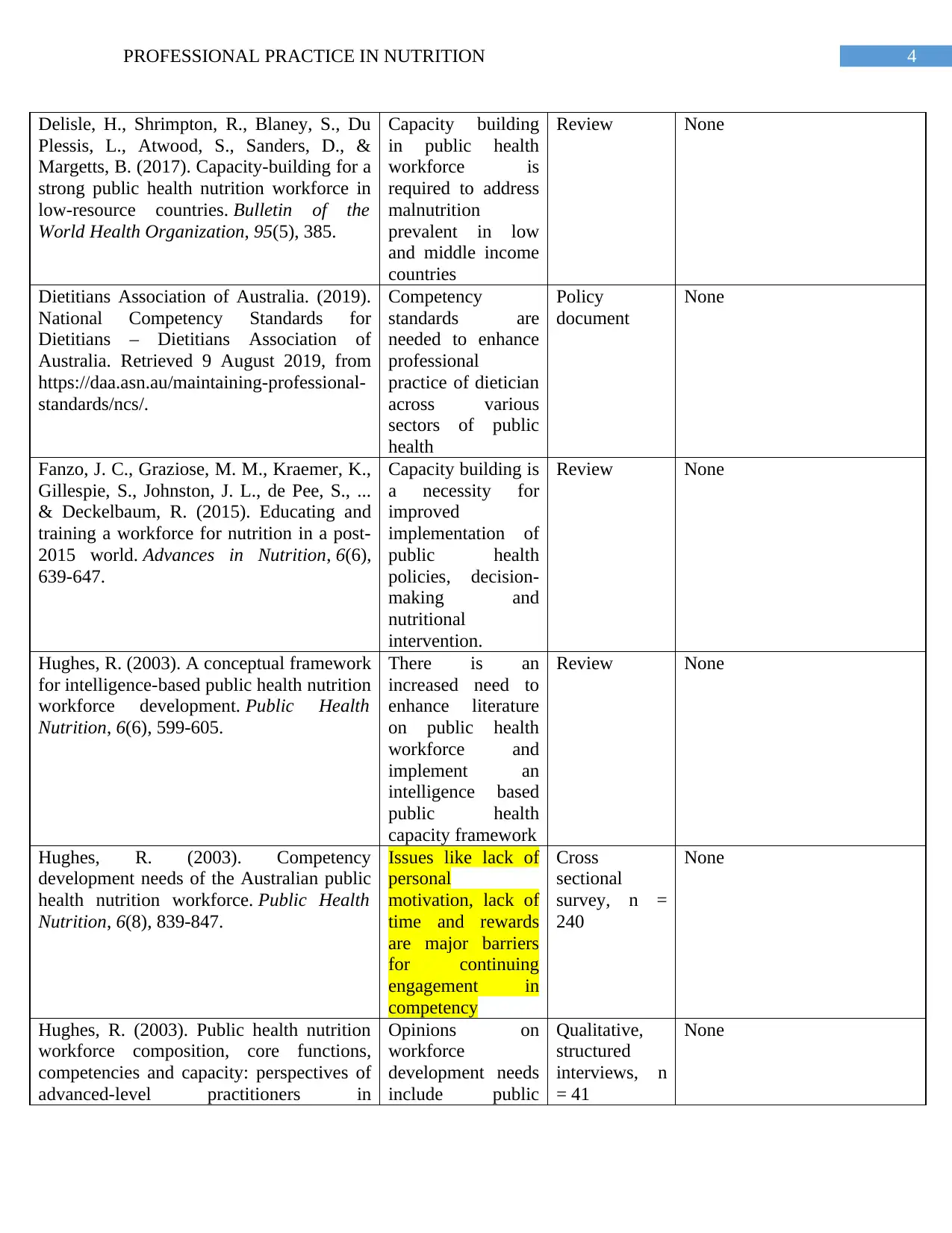
4PROFESSIONAL PRACTICE IN NUTRITION
Delisle, H., Shrimpton, R., Blaney, S., Du
Plessis, L., Atwood, S., Sanders, D., &
Margetts, B. (2017). Capacity-building for a
strong public health nutrition workforce in
low-resource countries. Bulletin of the
World Health Organization, 95(5), 385.
Capacity building
in public health
workforce is
required to address
malnutrition
prevalent in low
and middle income
countries
Review None
Dietitians Association of Australia. (2019).
National Competency Standards for
Dietitians – Dietitians Association of
Australia. Retrieved 9 August 2019, from
https://daa.asn.au/maintaining-professional-
standards/ncs/.
Competency
standards are
needed to enhance
professional
practice of dietician
across various
sectors of public
health
Policy
document
None
Fanzo, J. C., Graziose, M. M., Kraemer, K.,
Gillespie, S., Johnston, J. L., de Pee, S., ...
& Deckelbaum, R. (2015). Educating and
training a workforce for nutrition in a post-
2015 world. Advances in Nutrition, 6(6),
639-647.
Capacity building is
a necessity for
improved
implementation of
public health
policies, decision-
making and
nutritional
intervention.
Review None
Hughes, R. (2003). A conceptual framework
for intelligence-based public health nutrition
workforce development. Public Health
Nutrition, 6(6), 599-605.
There is an
increased need to
enhance literature
on public health
workforce and
implement an
intelligence based
public health
capacity framework
Review None
Hughes, R. (2003). Competency
development needs of the Australian public
health nutrition workforce. Public Health
Nutrition, 6(8), 839-847.
Issues like lack of
personal
motivation, lack of
time and rewards
are major barriers
for continuing
engagement in
competency
Cross
sectional
survey, n =
240
None
Hughes, R. (2003). Public health nutrition
workforce composition, core functions,
competencies and capacity: perspectives of
advanced-level practitioners in
Opinions on
workforce
development needs
include public
Qualitative,
structured
interviews, n
= 41
None
Delisle, H., Shrimpton, R., Blaney, S., Du
Plessis, L., Atwood, S., Sanders, D., &
Margetts, B. (2017). Capacity-building for a
strong public health nutrition workforce in
low-resource countries. Bulletin of the
World Health Organization, 95(5), 385.
Capacity building
in public health
workforce is
required to address
malnutrition
prevalent in low
and middle income
countries
Review None
Dietitians Association of Australia. (2019).
National Competency Standards for
Dietitians – Dietitians Association of
Australia. Retrieved 9 August 2019, from
https://daa.asn.au/maintaining-professional-
standards/ncs/.
Competency
standards are
needed to enhance
professional
practice of dietician
across various
sectors of public
health
Policy
document
None
Fanzo, J. C., Graziose, M. M., Kraemer, K.,
Gillespie, S., Johnston, J. L., de Pee, S., ...
& Deckelbaum, R. (2015). Educating and
training a workforce for nutrition in a post-
2015 world. Advances in Nutrition, 6(6),
639-647.
Capacity building is
a necessity for
improved
implementation of
public health
policies, decision-
making and
nutritional
intervention.
Review None
Hughes, R. (2003). A conceptual framework
for intelligence-based public health nutrition
workforce development. Public Health
Nutrition, 6(6), 599-605.
There is an
increased need to
enhance literature
on public health
workforce and
implement an
intelligence based
public health
capacity framework
Review None
Hughes, R. (2003). Competency
development needs of the Australian public
health nutrition workforce. Public Health
Nutrition, 6(8), 839-847.
Issues like lack of
personal
motivation, lack of
time and rewards
are major barriers
for continuing
engagement in
competency
Cross
sectional
survey, n =
240
None
Hughes, R. (2003). Public health nutrition
workforce composition, core functions,
competencies and capacity: perspectives of
advanced-level practitioners in
Opinions on
workforce
development needs
include public
Qualitative,
structured
interviews, n
= 41
None
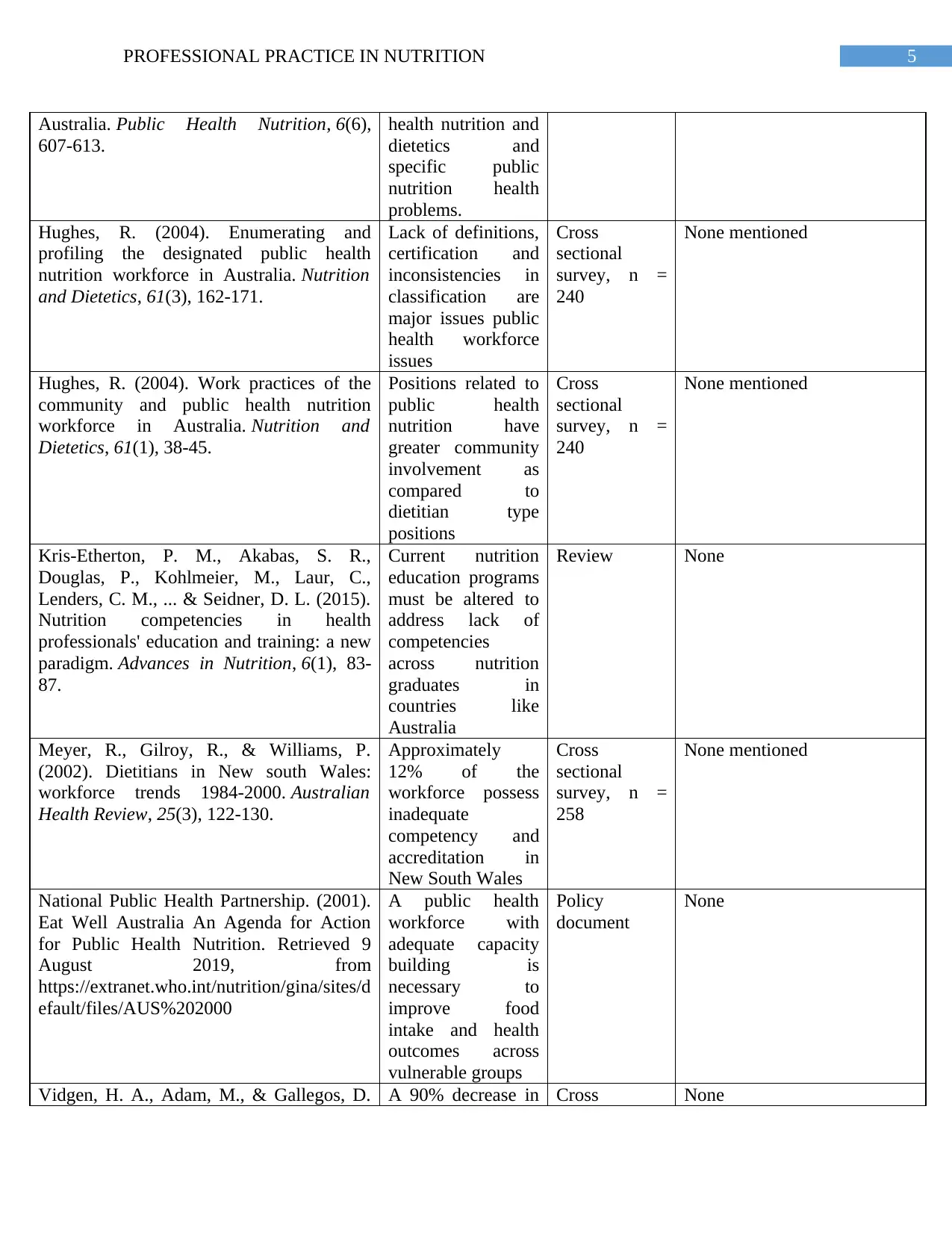
5PROFESSIONAL PRACTICE IN NUTRITION
Australia. Public Health Nutrition, 6(6),
607-613.
health nutrition and
dietetics and
specific public
nutrition health
problems.
Hughes, R. (2004). Enumerating and
profiling the designated public health
nutrition workforce in Australia. Nutrition
and Dietetics, 61(3), 162-171.
Lack of definitions,
certification and
inconsistencies in
classification are
major issues public
health workforce
issues
Cross
sectional
survey, n =
240
None mentioned
Hughes, R. (2004). Work practices of the
community and public health nutrition
workforce in Australia. Nutrition and
Dietetics, 61(1), 38-45.
Positions related to
public health
nutrition have
greater community
involvement as
compared to
dietitian type
positions
Cross
sectional
survey, n =
240
None mentioned
Kris-Etherton, P. M., Akabas, S. R.,
Douglas, P., Kohlmeier, M., Laur, C.,
Lenders, C. M., ... & Seidner, D. L. (2015).
Nutrition competencies in health
professionals' education and training: a new
paradigm. Advances in Nutrition, 6(1), 83-
87.
Current nutrition
education programs
must be altered to
address lack of
competencies
across nutrition
graduates in
countries like
Australia
Review None
Meyer, R., Gilroy, R., & Williams, P.
(2002). Dietitians in New south Wales:
workforce trends 1984-2000. Australian
Health Review, 25(3), 122-130.
Approximately
12% of the
workforce possess
inadequate
competency and
accreditation in
New South Wales
Cross
sectional
survey, n =
258
None mentioned
National Public Health Partnership. (2001).
Eat Well Australia An Agenda for Action
for Public Health Nutrition. Retrieved 9
August 2019, from
https://extranet.who.int/nutrition/gina/sites/d
efault/files/AUS%202000
A public health
workforce with
adequate capacity
building is
necessary to
improve food
intake and health
outcomes across
vulnerable groups
Policy
document
None
Vidgen, H. A., Adam, M., & Gallegos, D. A 90% decrease in Cross None
Australia. Public Health Nutrition, 6(6),
607-613.
health nutrition and
dietetics and
specific public
nutrition health
problems.
Hughes, R. (2004). Enumerating and
profiling the designated public health
nutrition workforce in Australia. Nutrition
and Dietetics, 61(3), 162-171.
Lack of definitions,
certification and
inconsistencies in
classification are
major issues public
health workforce
issues
Cross
sectional
survey, n =
240
None mentioned
Hughes, R. (2004). Work practices of the
community and public health nutrition
workforce in Australia. Nutrition and
Dietetics, 61(1), 38-45.
Positions related to
public health
nutrition have
greater community
involvement as
compared to
dietitian type
positions
Cross
sectional
survey, n =
240
None mentioned
Kris-Etherton, P. M., Akabas, S. R.,
Douglas, P., Kohlmeier, M., Laur, C.,
Lenders, C. M., ... & Seidner, D. L. (2015).
Nutrition competencies in health
professionals' education and training: a new
paradigm. Advances in Nutrition, 6(1), 83-
87.
Current nutrition
education programs
must be altered to
address lack of
competencies
across nutrition
graduates in
countries like
Australia
Review None
Meyer, R., Gilroy, R., & Williams, P.
(2002). Dietitians in New south Wales:
workforce trends 1984-2000. Australian
Health Review, 25(3), 122-130.
Approximately
12% of the
workforce possess
inadequate
competency and
accreditation in
New South Wales
Cross
sectional
survey, n =
258
None mentioned
National Public Health Partnership. (2001).
Eat Well Australia An Agenda for Action
for Public Health Nutrition. Retrieved 9
August 2019, from
https://extranet.who.int/nutrition/gina/sites/d
efault/files/AUS%202000
A public health
workforce with
adequate capacity
building is
necessary to
improve food
intake and health
outcomes across
vulnerable groups
Policy
document
None
Vidgen, H. A., Adam, M., & Gallegos, D. A 90% decrease in Cross None
⊘ This is a preview!⊘
Do you want full access?
Subscribe today to unlock all pages.

Trusted by 1+ million students worldwide
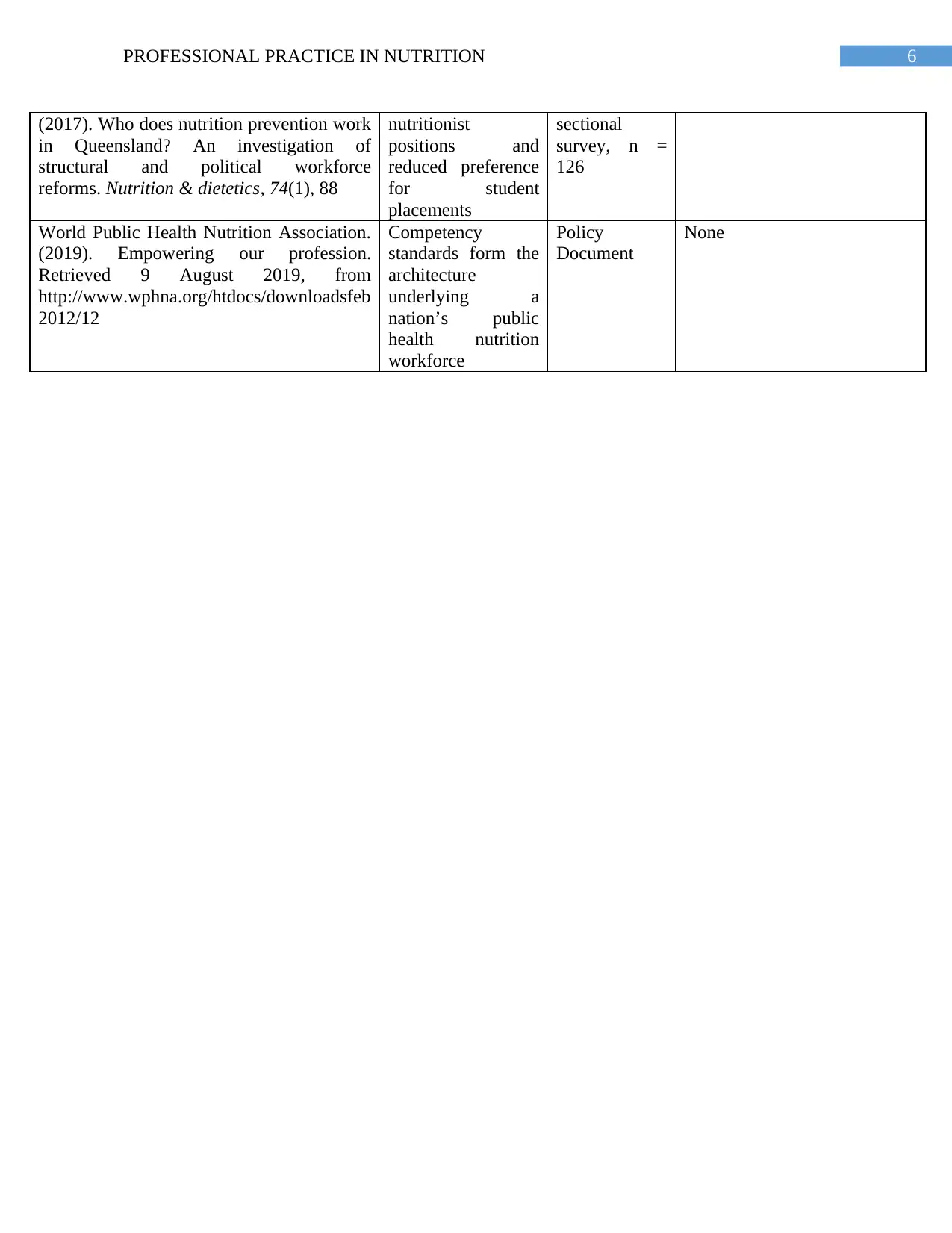
6PROFESSIONAL PRACTICE IN NUTRITION
(2017). Who does nutrition prevention work
in Queensland? An investigation of
structural and political workforce
reforms. Nutrition & dietetics, 74(1), 88
nutritionist
positions and
reduced preference
for student
placements
sectional
survey, n =
126
World Public Health Nutrition Association.
(2019). Empowering our profession.
Retrieved 9 August 2019, from
http://www.wphna.org/htdocs/downloadsfeb
2012/12
Competency
standards form the
architecture
underlying a
nation’s public
health nutrition
workforce
Policy
Document
None
(2017). Who does nutrition prevention work
in Queensland? An investigation of
structural and political workforce
reforms. Nutrition & dietetics, 74(1), 88
nutritionist
positions and
reduced preference
for student
placements
sectional
survey, n =
126
World Public Health Nutrition Association.
(2019). Empowering our profession.
Retrieved 9 August 2019, from
http://www.wphna.org/htdocs/downloadsfeb
2012/12
Competency
standards form the
architecture
underlying a
nation’s public
health nutrition
workforce
Policy
Document
None
Paraphrase This Document
Need a fresh take? Get an instant paraphrase of this document with our AI Paraphraser
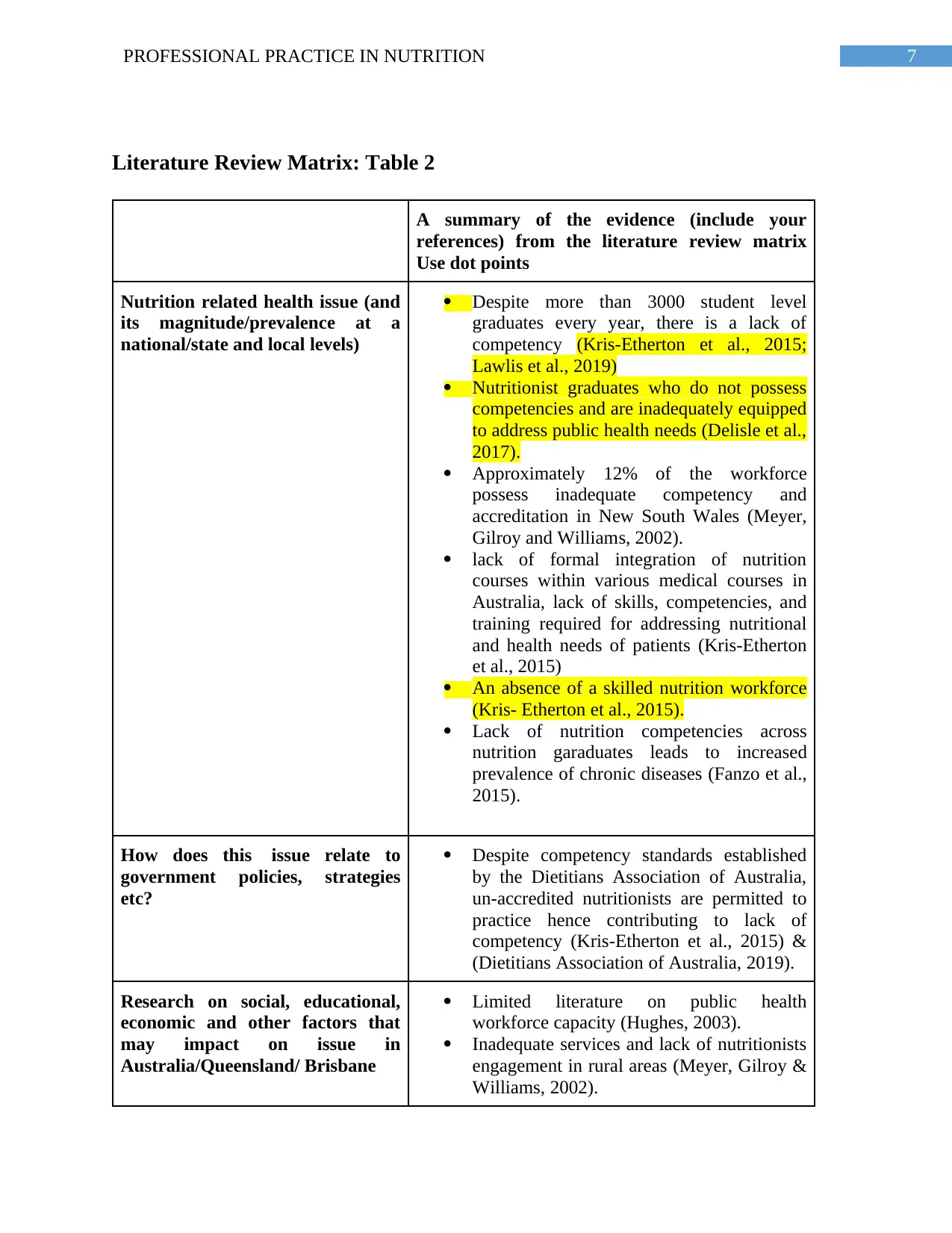
7PROFESSIONAL PRACTICE IN NUTRITION
Literature Review Matrix: Table 2
A summary of the evidence (include your
references) from the literature review matrix
Use dot points
Nutrition related health issue (and
its magnitude/prevalence at a
national/state and local levels)
Despite more than 3000 student level
graduates every year, there is a lack of
competency (Kris-Etherton et al., 2015;
Lawlis et al., 2019)
Nutritionist graduates who do not possess
competencies and are inadequately equipped
to address public health needs (Delisle et al.,
2017).
Approximately 12% of the workforce
possess inadequate competency and
accreditation in New South Wales (Meyer,
Gilroy and Williams, 2002).
lack of formal integration of nutrition
courses within various medical courses in
Australia, lack of skills, competencies, and
training required for addressing nutritional
and health needs of patients (Kris-Etherton
et al., 2015)
An absence of a skilled nutrition workforce
(Kris- Etherton et al., 2015).
Lack of nutrition competencies across
nutrition garaduates leads to increased
prevalence of chronic diseases (Fanzo et al.,
2015).
How does this issue relate to
government policies, strategies
etc?
Despite competency standards established
by the Dietitians Association of Australia,
un-accredited nutritionists are permitted to
practice hence contributing to lack of
competency (Kris-Etherton et al., 2015) &
(Dietitians Association of Australia, 2019).
Research on social, educational,
economic and other factors that
may impact on issue in
Australia/Queensland/ Brisbane
Limited literature on public health
workforce capacity (Hughes, 2003).
Inadequate services and lack of nutritionists
engagement in rural areas (Meyer, Gilroy &
Williams, 2002).
Literature Review Matrix: Table 2
A summary of the evidence (include your
references) from the literature review matrix
Use dot points
Nutrition related health issue (and
its magnitude/prevalence at a
national/state and local levels)
Despite more than 3000 student level
graduates every year, there is a lack of
competency (Kris-Etherton et al., 2015;
Lawlis et al., 2019)
Nutritionist graduates who do not possess
competencies and are inadequately equipped
to address public health needs (Delisle et al.,
2017).
Approximately 12% of the workforce
possess inadequate competency and
accreditation in New South Wales (Meyer,
Gilroy and Williams, 2002).
lack of formal integration of nutrition
courses within various medical courses in
Australia, lack of skills, competencies, and
training required for addressing nutritional
and health needs of patients (Kris-Etherton
et al., 2015)
An absence of a skilled nutrition workforce
(Kris- Etherton et al., 2015).
Lack of nutrition competencies across
nutrition garaduates leads to increased
prevalence of chronic diseases (Fanzo et al.,
2015).
How does this issue relate to
government policies, strategies
etc?
Despite competency standards established
by the Dietitians Association of Australia,
un-accredited nutritionists are permitted to
practice hence contributing to lack of
competency (Kris-Etherton et al., 2015) &
(Dietitians Association of Australia, 2019).
Research on social, educational,
economic and other factors that
may impact on issue in
Australia/Queensland/ Brisbane
Limited literature on public health
workforce capacity (Hughes, 2003).
Inadequate services and lack of nutritionists
engagement in rural areas (Meyer, Gilroy &
Williams, 2002).
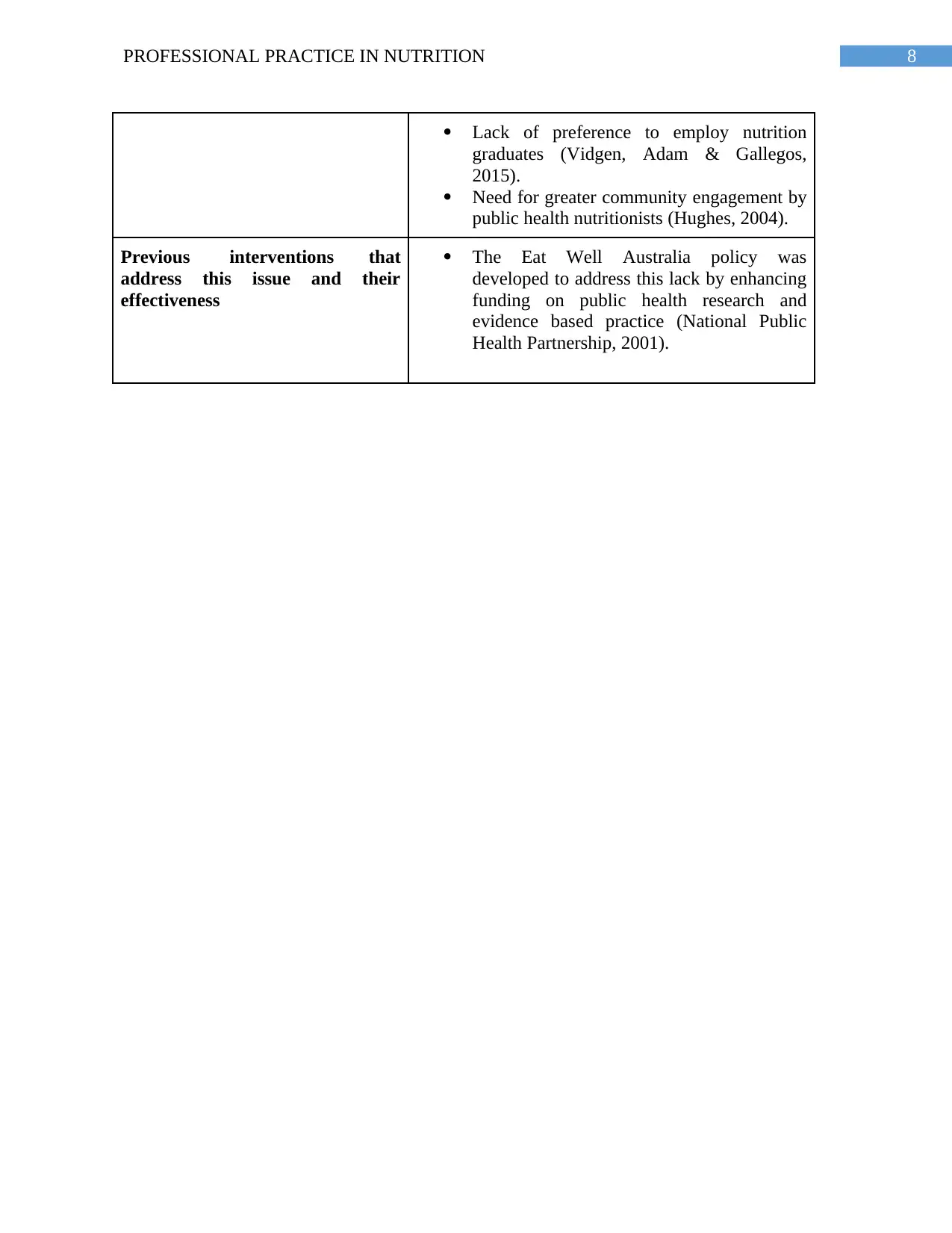
8PROFESSIONAL PRACTICE IN NUTRITION
Lack of preference to employ nutrition
graduates (Vidgen, Adam & Gallegos,
2015).
Need for greater community engagement by
public health nutritionists (Hughes, 2004).
Previous interventions that
address this issue and their
effectiveness
The Eat Well Australia policy was
developed to address this lack by enhancing
funding on public health research and
evidence based practice (National Public
Health Partnership, 2001).
Lack of preference to employ nutrition
graduates (Vidgen, Adam & Gallegos,
2015).
Need for greater community engagement by
public health nutritionists (Hughes, 2004).
Previous interventions that
address this issue and their
effectiveness
The Eat Well Australia policy was
developed to address this lack by enhancing
funding on public health research and
evidence based practice (National Public
Health Partnership, 2001).
⊘ This is a preview!⊘
Do you want full access?
Subscribe today to unlock all pages.

Trusted by 1+ million students worldwide
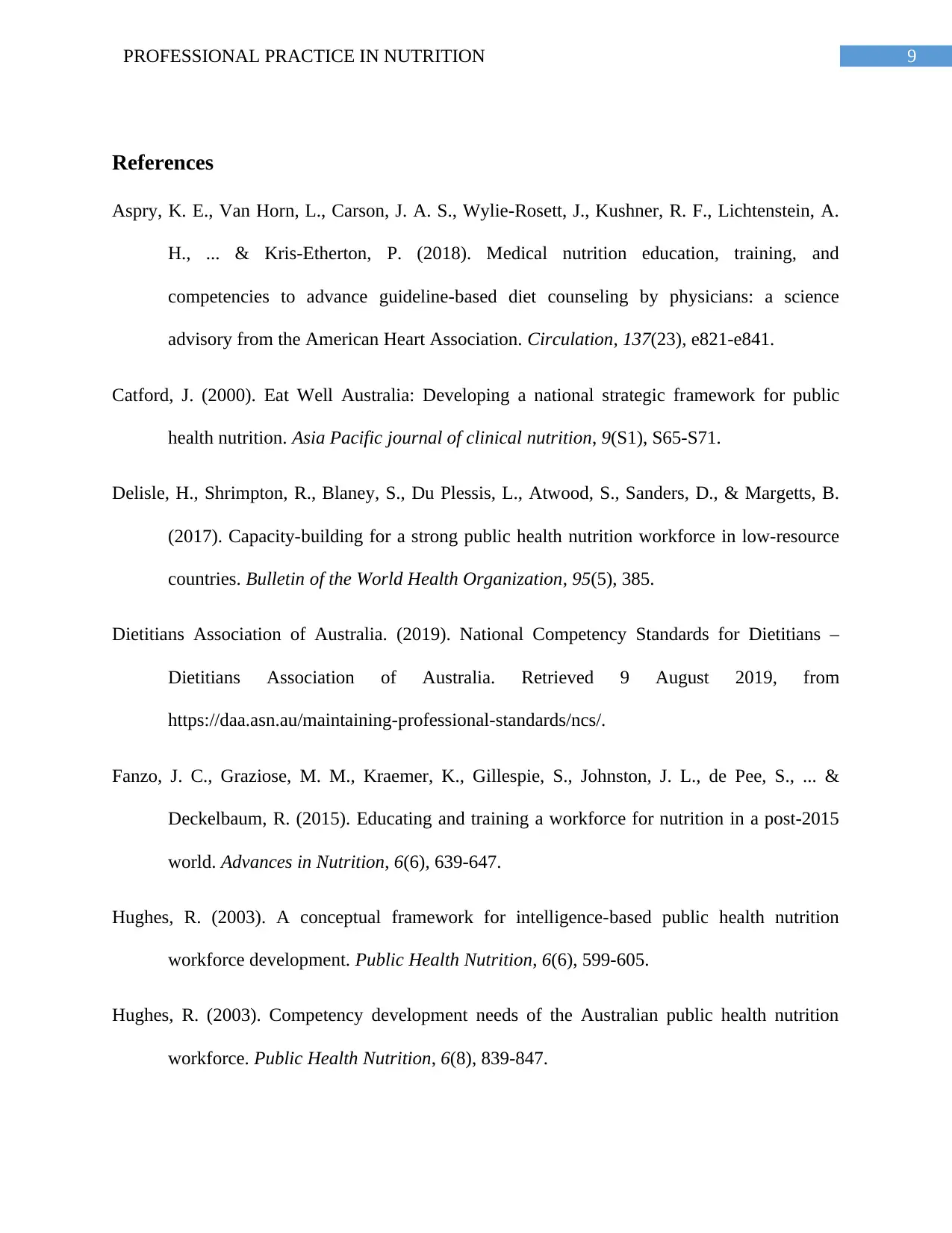
9PROFESSIONAL PRACTICE IN NUTRITION
References
Aspry, K. E., Van Horn, L., Carson, J. A. S., Wylie-Rosett, J., Kushner, R. F., Lichtenstein, A.
H., ... & Kris-Etherton, P. (2018). Medical nutrition education, training, and
competencies to advance guideline-based diet counseling by physicians: a science
advisory from the American Heart Association. Circulation, 137(23), e821-e841.
Catford, J. (2000). Eat Well Australia: Developing a national strategic framework for public
health nutrition. Asia Pacific journal of clinical nutrition, 9(S1), S65-S71.
Delisle, H., Shrimpton, R., Blaney, S., Du Plessis, L., Atwood, S., Sanders, D., & Margetts, B.
(2017). Capacity-building for a strong public health nutrition workforce in low-resource
countries. Bulletin of the World Health Organization, 95(5), 385.
Dietitians Association of Australia. (2019). National Competency Standards for Dietitians –
Dietitians Association of Australia. Retrieved 9 August 2019, from
https://daa.asn.au/maintaining-professional-standards/ncs/.
Fanzo, J. C., Graziose, M. M., Kraemer, K., Gillespie, S., Johnston, J. L., de Pee, S., ... &
Deckelbaum, R. (2015). Educating and training a workforce for nutrition in a post-2015
world. Advances in Nutrition, 6(6), 639-647.
Hughes, R. (2003). A conceptual framework for intelligence-based public health nutrition
workforce development. Public Health Nutrition, 6(6), 599-605.
Hughes, R. (2003). Competency development needs of the Australian public health nutrition
workforce. Public Health Nutrition, 6(8), 839-847.
References
Aspry, K. E., Van Horn, L., Carson, J. A. S., Wylie-Rosett, J., Kushner, R. F., Lichtenstein, A.
H., ... & Kris-Etherton, P. (2018). Medical nutrition education, training, and
competencies to advance guideline-based diet counseling by physicians: a science
advisory from the American Heart Association. Circulation, 137(23), e821-e841.
Catford, J. (2000). Eat Well Australia: Developing a national strategic framework for public
health nutrition. Asia Pacific journal of clinical nutrition, 9(S1), S65-S71.
Delisle, H., Shrimpton, R., Blaney, S., Du Plessis, L., Atwood, S., Sanders, D., & Margetts, B.
(2017). Capacity-building for a strong public health nutrition workforce in low-resource
countries. Bulletin of the World Health Organization, 95(5), 385.
Dietitians Association of Australia. (2019). National Competency Standards for Dietitians –
Dietitians Association of Australia. Retrieved 9 August 2019, from
https://daa.asn.au/maintaining-professional-standards/ncs/.
Fanzo, J. C., Graziose, M. M., Kraemer, K., Gillespie, S., Johnston, J. L., de Pee, S., ... &
Deckelbaum, R. (2015). Educating and training a workforce for nutrition in a post-2015
world. Advances in Nutrition, 6(6), 639-647.
Hughes, R. (2003). A conceptual framework for intelligence-based public health nutrition
workforce development. Public Health Nutrition, 6(6), 599-605.
Hughes, R. (2003). Competency development needs of the Australian public health nutrition
workforce. Public Health Nutrition, 6(8), 839-847.
Paraphrase This Document
Need a fresh take? Get an instant paraphrase of this document with our AI Paraphraser
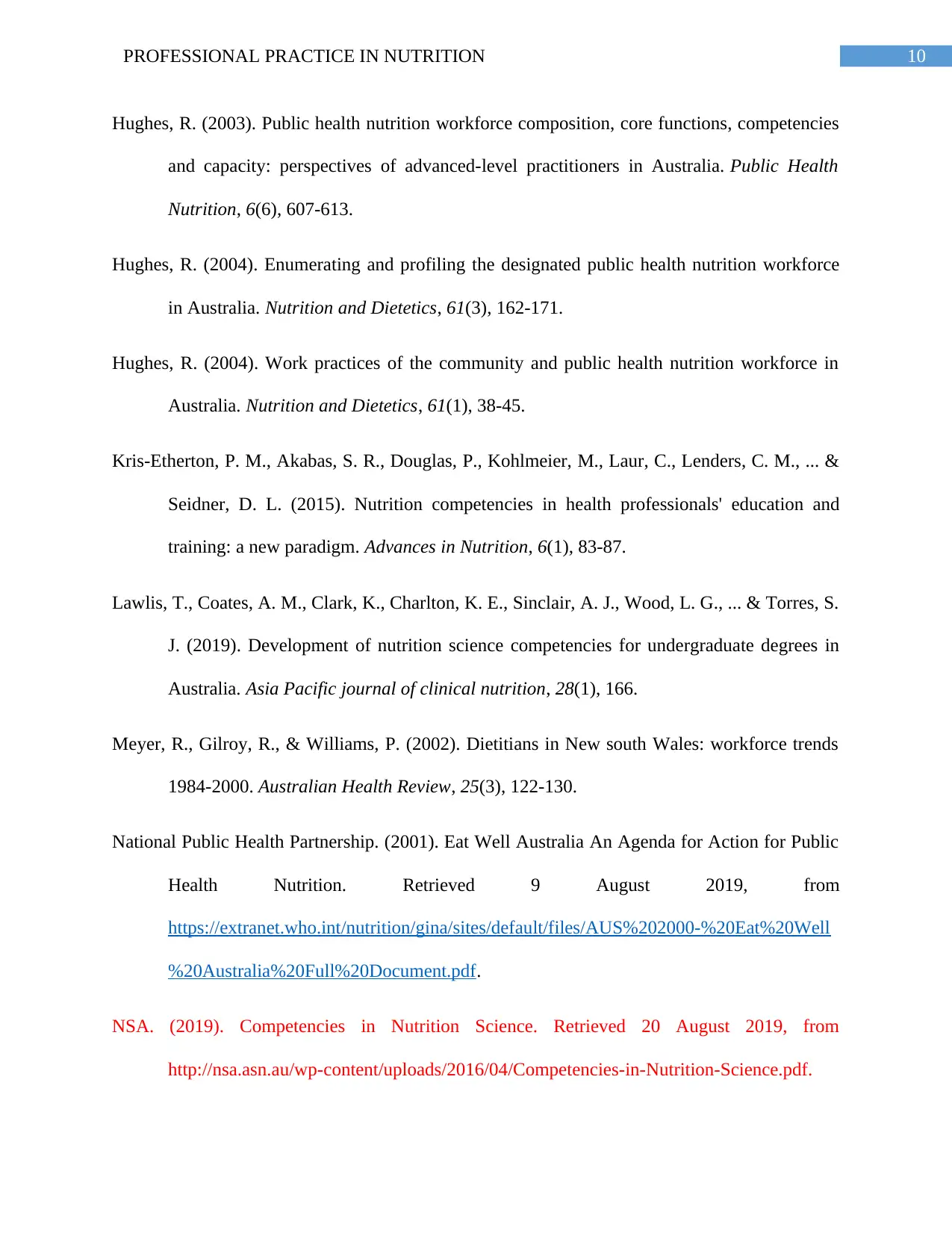
10PROFESSIONAL PRACTICE IN NUTRITION
Hughes, R. (2003). Public health nutrition workforce composition, core functions, competencies
and capacity: perspectives of advanced-level practitioners in Australia. Public Health
Nutrition, 6(6), 607-613.
Hughes, R. (2004). Enumerating and profiling the designated public health nutrition workforce
in Australia. Nutrition and Dietetics, 61(3), 162-171.
Hughes, R. (2004). Work practices of the community and public health nutrition workforce in
Australia. Nutrition and Dietetics, 61(1), 38-45.
Kris-Etherton, P. M., Akabas, S. R., Douglas, P., Kohlmeier, M., Laur, C., Lenders, C. M., ... &
Seidner, D. L. (2015). Nutrition competencies in health professionals' education and
training: a new paradigm. Advances in Nutrition, 6(1), 83-87.
Lawlis, T., Coates, A. M., Clark, K., Charlton, K. E., Sinclair, A. J., Wood, L. G., ... & Torres, S.
J. (2019). Development of nutrition science competencies for undergraduate degrees in
Australia. Asia Pacific journal of clinical nutrition, 28(1), 166.
Meyer, R., Gilroy, R., & Williams, P. (2002). Dietitians in New south Wales: workforce trends
1984-2000. Australian Health Review, 25(3), 122-130.
National Public Health Partnership. (2001). Eat Well Australia An Agenda for Action for Public
Health Nutrition. Retrieved 9 August 2019, from
https://extranet.who.int/nutrition/gina/sites/default/files/AUS%202000-%20Eat%20Well
%20Australia%20Full%20Document.pdf.
NSA. (2019). Competencies in Nutrition Science. Retrieved 20 August 2019, from
http://nsa.asn.au/wp-content/uploads/2016/04/Competencies-in-Nutrition-Science.pdf.
Hughes, R. (2003). Public health nutrition workforce composition, core functions, competencies
and capacity: perspectives of advanced-level practitioners in Australia. Public Health
Nutrition, 6(6), 607-613.
Hughes, R. (2004). Enumerating and profiling the designated public health nutrition workforce
in Australia. Nutrition and Dietetics, 61(3), 162-171.
Hughes, R. (2004). Work practices of the community and public health nutrition workforce in
Australia. Nutrition and Dietetics, 61(1), 38-45.
Kris-Etherton, P. M., Akabas, S. R., Douglas, P., Kohlmeier, M., Laur, C., Lenders, C. M., ... &
Seidner, D. L. (2015). Nutrition competencies in health professionals' education and
training: a new paradigm. Advances in Nutrition, 6(1), 83-87.
Lawlis, T., Coates, A. M., Clark, K., Charlton, K. E., Sinclair, A. J., Wood, L. G., ... & Torres, S.
J. (2019). Development of nutrition science competencies for undergraduate degrees in
Australia. Asia Pacific journal of clinical nutrition, 28(1), 166.
Meyer, R., Gilroy, R., & Williams, P. (2002). Dietitians in New south Wales: workforce trends
1984-2000. Australian Health Review, 25(3), 122-130.
National Public Health Partnership. (2001). Eat Well Australia An Agenda for Action for Public
Health Nutrition. Retrieved 9 August 2019, from
https://extranet.who.int/nutrition/gina/sites/default/files/AUS%202000-%20Eat%20Well
%20Australia%20Full%20Document.pdf.
NSA. (2019). Competencies in Nutrition Science. Retrieved 20 August 2019, from
http://nsa.asn.au/wp-content/uploads/2016/04/Competencies-in-Nutrition-Science.pdf.
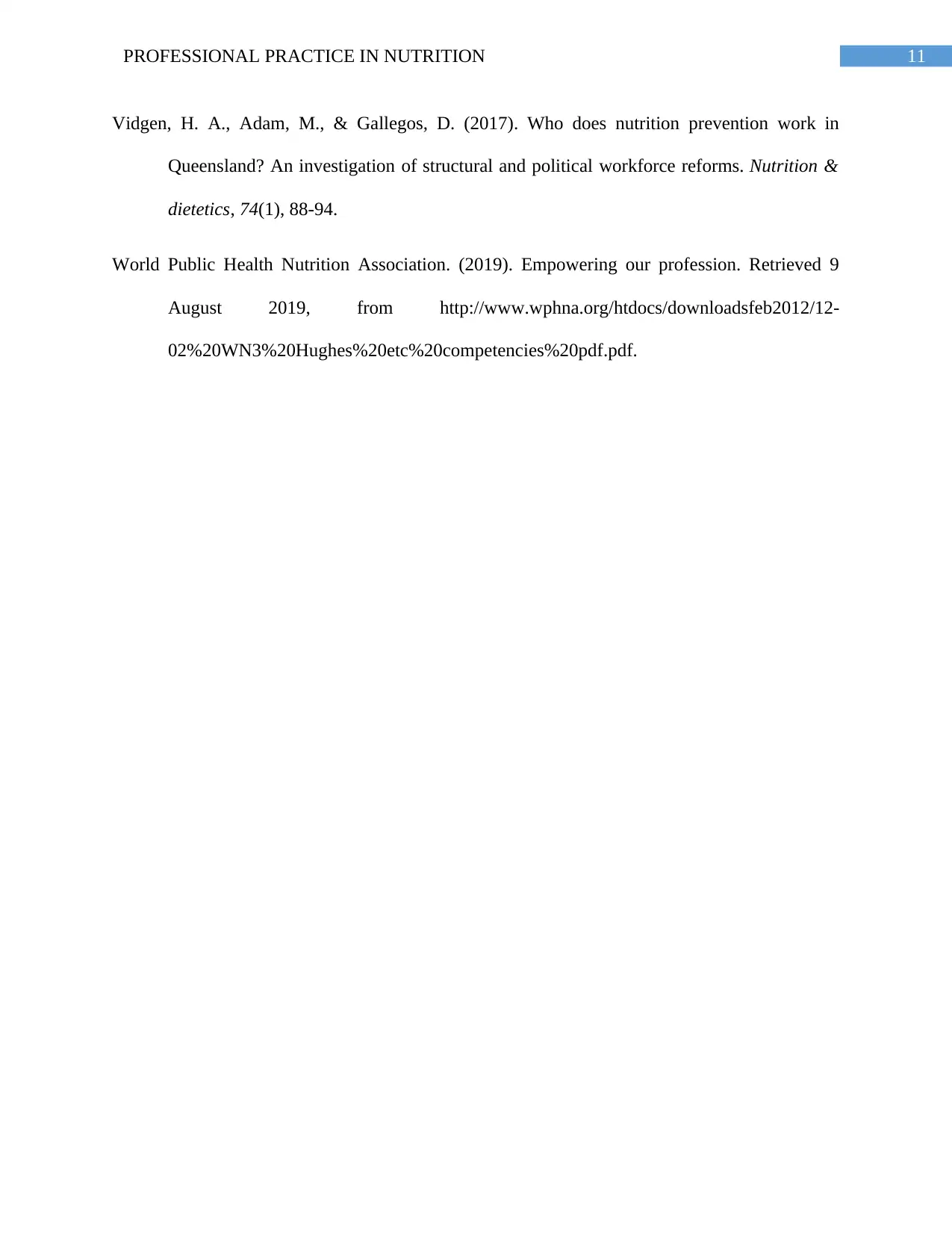
11PROFESSIONAL PRACTICE IN NUTRITION
Vidgen, H. A., Adam, M., & Gallegos, D. (2017). Who does nutrition prevention work in
Queensland? An investigation of structural and political workforce reforms. Nutrition &
dietetics, 74(1), 88-94.
World Public Health Nutrition Association. (2019). Empowering our profession. Retrieved 9
August 2019, from http://www.wphna.org/htdocs/downloadsfeb2012/12-
02%20WN3%20Hughes%20etc%20competencies%20pdf.pdf.
Vidgen, H. A., Adam, M., & Gallegos, D. (2017). Who does nutrition prevention work in
Queensland? An investigation of structural and political workforce reforms. Nutrition &
dietetics, 74(1), 88-94.
World Public Health Nutrition Association. (2019). Empowering our profession. Retrieved 9
August 2019, from http://www.wphna.org/htdocs/downloadsfeb2012/12-
02%20WN3%20Hughes%20etc%20competencies%20pdf.pdf.
⊘ This is a preview!⊘
Do you want full access?
Subscribe today to unlock all pages.

Trusted by 1+ million students worldwide
1 out of 12
Your All-in-One AI-Powered Toolkit for Academic Success.
+13062052269
info@desklib.com
Available 24*7 on WhatsApp / Email
![[object Object]](/_next/static/media/star-bottom.7253800d.svg)
Unlock your academic potential
Copyright © 2020–2025 A2Z Services. All Rights Reserved. Developed and managed by ZUCOL.


